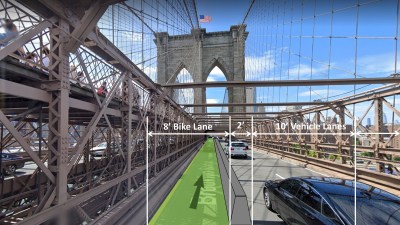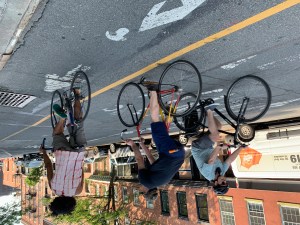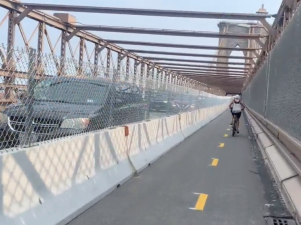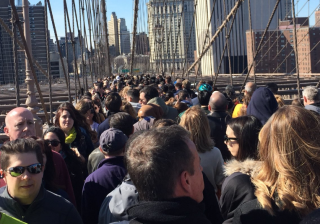Cycling is Up, Car Trips are Down, De Blasio is Confused
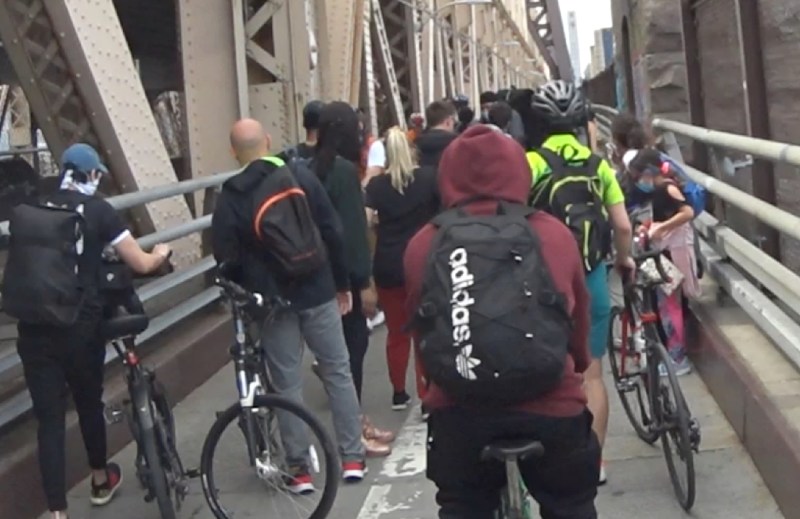

Here’s some fuzzy math: Cycling over the city’s East River bridges continues to increase, while car traffic over the very same spans continues to fall — yet the de Blasio administration is doing nothing to add space for bike riders.
The number of cyclists pedaling on weekdays across the East River spans in October was up 30 percent compared to last October, while the number of people driving over is down 13 percent, according to data from the Department of Transportation — reinforcing the dire need for the city to quickly make more room for people on bikes instead of in cars.
“There’s still time for DOT to get a program to better accommodate all these people to make it safer,” said Bike New York’s Jon Orcutt.
The downward trend in driving has been consistent since July, according to DOT. On an average weekday this July, 434,917 people drove over the Brooklyn, Queensboro, Williamsburg, and Manhattan bridges — nearly 30,000 fewer than on an average day in July, 2019. That’s a 6-percent drop.
By October, the decline had gotten bigger: 437,925 people drove over the bridges on an average weekday — 70,218 fewer than the year before, or a drop of 13 percent.
Meanwhile, more people are choosing to hop on two wheels to travel. Weekend bike trips almost doubled this past October, when more than 22,439 people biked over the East River, compared to the same time last year, when just 11,787 did.
Weekdays are also seeing an increase: In September, 26,773 cyclists headed into Manhattan, compared to 22,132 in 2019, an increase of 20 percent. And in October, 25,537 bikers crossed the East River compared to 19,614 the previous year — an increase of 30 percent, according to DOT data.
And weekday trips were up 30 percent from October 2019. pic.twitter.com/IkghtKTCEe
— Transportation Alternatives (@TransAlt) November 30, 2020
Specifically on the Queensboro Bridge, weekday bike trips were up a whopping 56 percent from 2019, according to Transportation Alternatives. (Obviously, there are tens of thousands more cars using the bridge, but drivers have access to nine lanes on the span, while east- and westbound cyclists get half of a single lane, and must share that overly crowded pathway with east- and westbound pedestrians.)
And Orcutt says what’s even more telling about the numbers, and a likely sign that new cyclists are here to stay, is that the increase in cyclists crossing the bridges between October this year and last — a nearly 100-percent jump, from 11,787 to 22,439 on weekends — was higher than between September 2019 and 2020 — a 28-percent increase, from 18,254 to 25,576 on weekends.
“The spread between 2020 and 2019 is higher in October than in September, I think we’re seeing people taking practical trips and retaining new cyclists or more frequent cyclists,” Orcutt said.
But Orcutt fears that with the change of leadership at DOT after Commissioner Polly Trottenberg announced her resignation for this month, any much-needed changes will be even further delayed.
“Who knows what happens now with the commissioner gone, if decision-making slows down,” he said.
Activists with Transportation Alternatives launched a campaign back in September, called Bridges4People, to give more space to pedestrians and cyclists by taking two lanes of traffic from each bridge and converting them into two-way bike lanes — a reallocation of space that advocates say is necessary to safely accommodate the bike boom.
“This moment requires citywide, transformative thinking, and this is a transformative campaign,” campaign volunteer Katherine Willis told Streetsblog at the time. “Now more than ever we see that there’s widespread demand to bike around NYC, but the city does not have infrastructure for people to bike in large numbers. The bridges between Manhattan and Brooklyn are a particular chokepoint that stop people from biking between the two boroughs.”
For years, cyclists and safe-street advocates have been sounding the alarm on the dangers of bridges’ narrow pathways that force bikers to share just mere feet of space with the rush of tourists. And just two months ago, Streetsblog reported that the city had to cough up tens of thousands of dollars to the victim of a crash on the Brooklyn Bridge, during which cyclist Carolea Goldfarb, an attorney at the Kings County District Attorney’s office, was knocked off her bike while commuting to work after a tourist walked into the bike lane. Goldfarb, who fractured her hand, requiring surgery, sued the city and was just awarded the $75,000 settlement after DOT honchos admitted that they are, and have been, aware of the dangerous conditions on the bridge.
And back in June, noted transportation expert Samuel “Gridlock Sam” Schwartz, an advocate for decades in the the livable-streets movement who helped spearhead congestion pricing, advanced a visionary proposal to build three new pedestrian-and-bike-only bridges into the core of Manhattan — two across the East River, and one across the Hudson — in an effort to address the surge in cycling because of the COVID-19 crisis.
Advocates said at the time that instead of spending millions on building entirely new bridges that would take years, the city should instead just easily make more room on the exiting spans by taking away lanes of traffic for cars and giving them to cyclists.
“We’re experiencing a bike boom TODAY. It’s sad that we as a city didn’t seize the low-traffic moment this spring to show the benefits of separate bike and walking lanes on the Queensboro Bridge,” Orcutt said about Schwartz’s vision for the three new bridges.
But despite the dangerously overcrowded conditions, DOT and Mayor de Blasio have failed to create any additional room for cyclists. Two members of the City Council have offered to pay for a big portion of the conversation of the South Outer Roadway on the Queensboro Bridge, but the city has not accept the discretionary funds — and has not provided Streetsblog with an explanation.
A spokeswoman for DOT told Streetsblog that the agency is “actively discussing” ways to add more pedestrian and cycling capacity to the Queensboro and Brooklyn bridges. It is the same comment that the agency has been issuing for months.
Editor’s note: An earlier version of this story had one percentage error. It’s been updated. Sorry.


